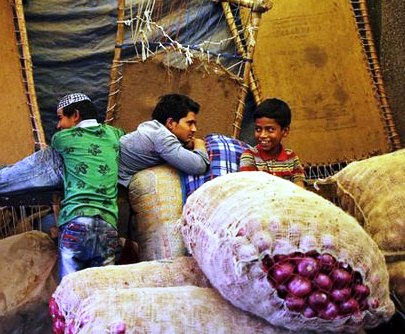How severely will demonetisation impact India’s agricultural supply chain and how badly will it dent farmer incomes?
Taking a dig at the NDA government, Rahul Gandhi today asked the Centre if it will now call the Supreme Court “anti-national,” following the apex court’s remarks on the demonetisation move.
“Will the government call the Supreme Court anti-national now?” he said on twitter, questioning the government.
He also tagged a report of Calcutta High Court telling the government that it has not done its homework and the Supreme court seeing a crisis ahead.
The remarks come at a time when the government is dubbing the Congress leaders questioning its demonetisation move as “anti-nationals”.
The real question that India should be worried about is this: How severely will demonetisation impact India’s agricultural supply chain and how badly will it dent farmer incomes?
A careful look at the various stakeholders involved in the agricultural supply chain shows that while business is down and supply of fruits and vegetables are starting to shrink, credit cycles will prop up supply for at most another 10-14 days. Farmers have to either accept credit or take a substantial hit on their produce. This credit, however, will be of no use if it can’t be cashed in time for planting of winter crops.
At the lowest, bottom-feeder level at Azadpur mandi, labourers and coolies (palledars) have also been crippled by the government’s demonetisation move: With very little work, many have doubled up as ‘cash mules’ for the more wealthier commission agents and now stand in long banking queues to exchange old notes.
According to the Confederation of All India Traders, India’s largest trader association, trade in the markets across the country has reduced by 25% post-demonetisation; Indian retail trade is currently estimated at about Rs 14,000 crore every day.
At Azadpur mandi – a sprawling wholesale vegetables and fruit market that counts itself as Asia’s largest – the agricultural supply chain is slowly choking.
Stakeholders within the ecosystem point out that the Modi government’s demonetisation move has reduced daily business volumes (Rs 20 crore to Rs 30 crore) by anywhere between 50% to 70%.
Large wholesale traders and commission agents speak of business contracting from all sides: consumers are buying less, arrivals of produce have decreased and current transactions are increasingly fuelled by a combination of old Rs 500 and Rs 1000 notes and a quickly dwindling goodwill-credit system.
The Azadpur mandi is a crucial market that provides a glimpse of what is slowly happening throughout the country. Almost a city within a city, it officially houses over 2,500 commission agents and wholesale traders. With over 40 lakh metric tonnes of fruits and vegetables passing through the wholesale market last year, the mandi, as one former minister once cheerfully put it, supplies most of North India’s nutrition and vitamin requirements.
Delhi Chief Minister Arvind Kejriwal and West Bengal Chief Minister Mamata Banerjee made it a focal point of their rallies against the Modi government’s demonetisation move.


